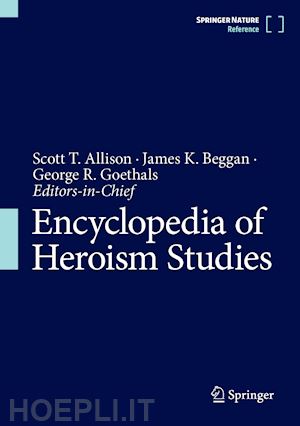

Questo prodotto usufruisce delle SPEDIZIONI GRATIS
selezionando l'opzione Corriere Veloce in fase di ordine.
Pagabile anche con Carta della cultura giovani e del merito, 18App Bonus Cultura e Carta del Docente
Baseball Heroes, the National Pastime, and American Culture.- Basketball Heroes and the Temporalities of Fandom.- Civil Rights Heroism.- Cultural Heroes.- Dark Triad and Herosism.- Emotional Intelligence and Heroism.- Ethical Leadership.- Fame and Celebrity.- Football Heroes and Heroines.- Gender and Heroism.- Good and Evil.- Hero Illiteracy.- Images of Heroes.- Leadership and Heroism.- Literary Heroes.- Nonconformity.- Obedience to Authority.- Political Heroes.- Power and Abuse of Power.- Prosocial Behavior.- Robot and AI Heroes.- Social Movements.- Social Values and Heroism.- Sport Heroes and Leadership.- Underdog as a Hero.- War Heroes.- Bystander Engagement with Bullying.- Ethics and Heroic Leadership: Paradoxes and Implications.- First Responders: Occupational Effects of Prolonged Trauma-Exposure.- Genocide and Heroism.- Journalism Heroes.- Moral Beauty.- Winnie Madikizela-Mandela: A Hero of the South African Liberation Struggle.- Anti-Heroism.- Children Heroes.- Climate Changeand Heroism.- Cybersecurity Heroism.- Hero Appreciation.- Heroes and Educational Equity.- Heroism and Autonomous Vehicles.- Heroism Motivation.- Influencers.- Mentorship and Heroic Leadership.- Moral Judgments.- Peer Pressure.- Public Service Heroism.- Social Media and Heroism.- Tabletop Roleplaying Games and Heroism.- Video Games and Heroism.
Scott T. Allison is Professor of Psychology at the University of Richmond. He has published extensively on heroism and leadership and numerous books, including Heroes and Heroic Leadership; Reel Heroes, Conceptions of Leadership; Frontiers in Spiritual Leadership; and the Handbook of Heroism and Heroic Leadership. His work has appeared in USA Today, National Public Radio, The New York Times, The Los Angeles Times, Slate Magazine, MSNBC, CBS, Psychology Today, and the Christian Science Monitor. He has received Richmond's Distinguished Educator Award and the Virginia Council of Higher Education's Outstanding Faculty Award.
James K. Beggan is Professor of Sociology at the University of Louisville, Kentucky, USA. He attended the State University of New York at Buffalo for his undergraduate work and earned a Ph.D. in psychology at the University of California, Santa Barbara. Over the years, he has taught courses on a wide range of topics including consumer behavior, industrial psychology, gender, human sexuality, quantitative research methods, statistics, and the self and society. He has published research on the psychology of ownership and the sexual self-concept, including how people overestimate their abilities to resist temptation. His current research interests involve logistical problems involved in creating and maintaining consensually nonmonogamous relationships, social conflicts created in human-animals interactions, and leadership dynamics. His books include Sexual Harassment, the Abuse of Power and the Crisis of Leadership: “Superstar” Harassers and How to Stop Them; The Dilemma of Coalition Formation in Consensual Nonmonogamy: Three Against Two Against One; How Our Love of Dogs Creates Social Conflict; and The Decisions to Open a Relationship: To Three or Not to Three. He coauthored The Hazards of Great Leadership: Detrimental Consequences of Leader Exceptionalism with Scott T. Allison and George Goethals.
George R. Goethals is the E. Claiborne Robins Distinguished Professor in Leadership Studies Emeritus at the University of Richmond. Previously he held academic and administrative appointments at Williams College where he served as the chair of the Department of Psychology, Acting Dean of the Faculty, Provost, and, finally, founder and chair of the Program in Leadership Studies. He taught courses on theories of leadership and presidential leadership. His recent scholarship focuses on presidential leadership, heroism and leader-follower dynamics. He has received the Lifetime Achievement Award from the International Leadership Association and Richmond’s Distinguished Scholarship Award.
Sections in the Encyclopedia:
History and popular culture: George R. Goethals
Social Science: Ari Kohen
Technology and Screens: Chris Comerford
Social Cognition: Elaine L. Kinsella
Social Justice: James K. Beggan
Social Psychology: Scott T. Allison











Il sito utilizza cookie ed altri strumenti di tracciamento che raccolgono informazioni dal dispositivo dell’utente. Oltre ai cookie tecnici ed analitici aggregati, strettamente necessari per il funzionamento di questo sito web, previo consenso dell’utente possono essere installati cookie di profilazione e marketing e cookie dei social media. Cliccando su “Accetto tutti i cookie” saranno attivate tutte le categorie di cookie. Per accettare solo deterninate categorie di cookie, cliccare invece su “Impostazioni cookie”. Chiudendo il banner o continuando a navigare saranno installati solo cookie tecnici. Per maggiori dettagli, consultare la Cookie Policy.